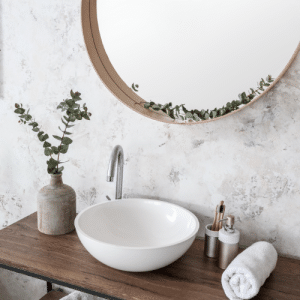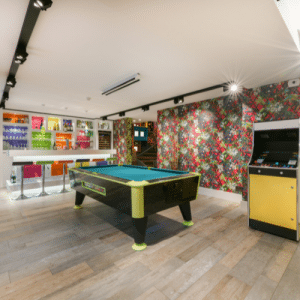The varieties of beautiful flooring materials and styles available can make choosing a kitchen floor an overwhelming experience. Much has to do with the personal preference of the look, but you should also think about the function of the flooring; as the kitchen is a high-traffic area, it is prone to spilling and dropping dishes and glassware. If you love to cook, you will also be standing for longer periods. Consider the following when selecting the ideal flooring for your family.
Hardwood
- Won’t look dated over time. Great for long term investment.
- Durability and Low-maintenance. Can withstand decades of use.
- Open floor plan. Flows smoothly with other rooms and flooring styles.
- Moisture-resistant if you choose a pre-finished type.
- Great warmth and visual appeal.
- Available in solid wood strips or engineered wood planks. Engineered wood is the better choice for kitchens as it has a veneer of real wood backed by layers of less expensive plywood providing stability and is less susceptible to movement caused by changes in humidity and temperature, which is common in kitchens.
Vinyl
- If you cook a lot, softest flooring option. The cushiness makes it easier on your feet while easing muscle fatigue.
- Low maintenance and easy to clean.
- More economically priced in comparison to other options.
- If you have butter fingers, you’ll have less breakage.
- Waterproof and stain-proof.
- Depending on the size and layout of your kitchen, you may have seams. which can let moisture into the subfloor and trap dirt if they aren’t tightly bonded.
- Versatile, comes in many colors and patterns.
- Thicker vinyl can feature a textured surface mimicking the look of ceramic tile and real stone.
- Can be dangerously slippery when wet.
- Good quality vinyl should last 20 years.
Stone
- Large variety including marble, travertine and slate.
- Due to variations in pattern and color, stone gives your kitchen flooring a unique, earthy look.
- Naturally cool, perfect in hotter areas. For cold climates, consider adding sub-floor radiant heat to warm the floors in the winter.
- The grain and coloring of the stone may vary dramatically, so you may want to hand select the pieces you want installed for a similar texture and tonal match.
- Hard, durable surface.
- Low maintenance, easy to clean.
- Certain stones may stain, requires routine sealing, or fragile stones like slate may chip easily.
Cork Flooring
- Eco-friendly choice. Made from sustainable material, the bark from the trees grows back and can be harvested repeatedly.
- Softer floor than wood or tile, so it is easier on the feet.
- Slip-resistance. The surface is naturally textured.
- Waterproof and compressible, which makes it comfortable and moisture-resistant.
- Unique grain pattern of swirls and speckles.
- Needs to be resealed every three to four years to help guard against scratches and prevent moisture from entering the seams between tiles.
Bamboo Flooring
- Eco-friendly products. Grows rapidly, so it’s a good, sustainable source.
- Strong and durable. The strength is one of the highest of the natural materials on the market.
- Select a reputable brand with the longest warranty possible, as the quality is reflected by the length of the warranty.
- Some bamboo flooring can dent easily.
Stop by our Allentown showroom to see how the right floor can bring out the beauty in your room.
Great Kitchens and Baths
1812 W. Tilghman St, Allentown, PA 18014
610.433.9800
Serving Allentown, Bethlehem, Easton, Lehigh Valley, PA and all surrounding areas




